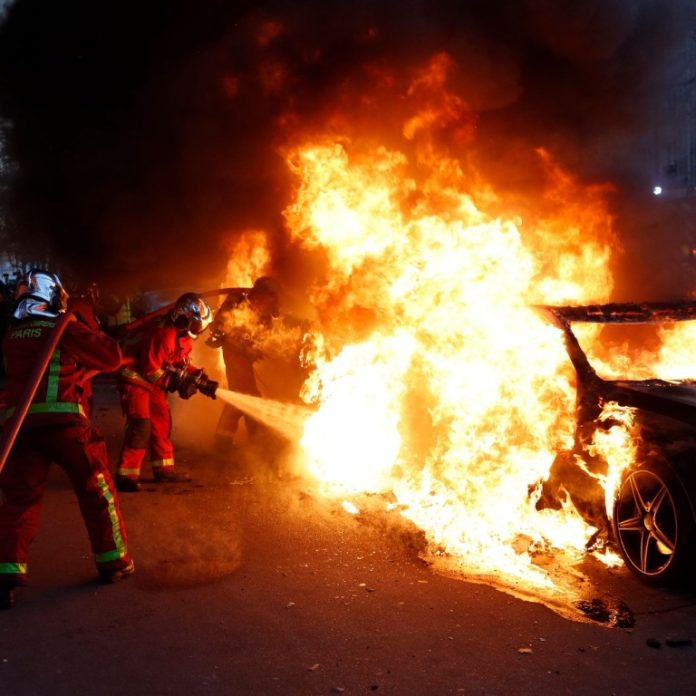It has been four days since France was rocked by a wave of protests after a 17-year-old youth was shot by police near Paris on Tuesday. Scenes and images of protestors setting fires to vehicles, climbing onto buildings with smashed windows, and fierce clashes with riot police officers have been circulating widely.
These events have prompted the government to take major actions, including banning demonstrations in some cities and issuing travel warnings. This has reignited the debate on overpolicing in marginalized communities.
The dire situation has compelled French President Emmanuel Macron to hold an emergency meeting with ministers. He aims to avert the crisis and bridge divisions, working towards uniting the country.
The Spark:
On Tuesday morning, a tragic incident occurred where a police officer fatally shot Nahel, a 17-year-old Algerian Muslim, in Nanterre, a suburb of Paris. Nahel was driving a car with a Polish license plate in the bus lane when the police attempted to stop him. However, he did not agree, leading the police to perceive him as a potential threat, resulting in the use of lethal force.
The incident was captured on video by a passerby, which quickly went viral and sparked widespread protests. The Muslim community in France initiated the demonstrations, demanding justice for Nahel, but unfortunately, the protests escalated into violence.
Nanterre prosecutor Pascal Prache has stated that the officer fired out of fear that the boy might run someone over with the car. It is believed that the officer acted unlawfully by using his weapon. As a result, a formal investigation has been launched, and the officer has been placed in preliminary detention, facing charges of voluntary homicide.

But is this the whole truth?
This situation has been taken over by the Muslim extremists who are chanting ‘Allahu Akbar’ while burning and vandalizing shops, cars, and both public and private property. The focus on addressing racial bias has been overshadowed by the rampant looting and violence. It’s important to note that France is home to one of Europe’s largest Muslim populations, accounting for nearly 9% of the country’s total population. Many of them are immigrants from Middle East and North Africa who sought refuge in France.

One of the protestors made the following comment, “Allahu Akbar. We are not scared, we’re Muslims—proud Muslims. If they try to kill us, we will kill them back. We are allowed, it is written in the Quran.”
It has been reported that some of the immigrants have played a significant role in the violence, allegedly including the burning down of the largest public library in Marseille.
There are differing perspectives on this issue. While the prevailing view emphasizes the long-standing issue of racism, there is another perspective, less known but plausible, suggesting that a certain community just need any excuse to engage in violence. An example of this is seen when similar levels of violence erupted across the country after France’s victory over Morocco in a World Cup soccer match.
Since then
The questions of police brutality and racism have been the major focal points of the incident. Protesters are seen carrying signs that read ‘the police kill,’ and in addition, numerous government buildings have been damaged. The escalation of violence is believed to be tapping into the existing racial bias within the country.
French officials have initiated a crackdown across France and its overseas territories to suppress the violence. Macron has deployed over 40,000 police officers to patrol the country, resulting in the arrest of more than 1,000 individuals. In Paris alone, 5,000 security personnel were deployed. So far, nearly 200 police officers have been injured.

French Interior Minister Gerard Darmanin has stated that officers have been granted powers to quell riots, make arrests, and ‘restore republican order.’
Macron has appealed to social media platforms for assistance, urging platforms like TikTok and Snapchat to remove the ‘most sensitive content’ and to identify users who exploit “social networks to call for disorder or to exacerbate violence.”
The widespread narrative
According to a 2017 study conducted by the independent human rights watchdog in France, Rights Defenders, it was found that young men perceived to be Black or Arab were 20 times more likely to be subjected to police stops compared to their counterparts. Organizations such as Amnesty International and the United Nations have also raised concerns about racial profiling and discriminatory behavior in France, but isn’t this too convenient?
Since the 2015 terrorist attacks of Charlie Hebdo, France has faced a series of extremist attacks perpetrated by Muslims extremists. These include incidents such as the October beheading of teacher Samuel Paty, the murder of three people at Notre Dame Basilica in Nice, in October 2019 the stabbing at the Paris police headquarters, and not to forget frequent and several lone wolf attacks. These events help explain why the police force in France remains on high alert.
There is no justification for the shooting of the teenager, which is undoubtedly a heinous crime. However, amidst the protests against police brutality and the call for addressing racism within institutions, it is important to acknowledge that individuals with the slogans of Allahu Akbar rioters are destroying France.

